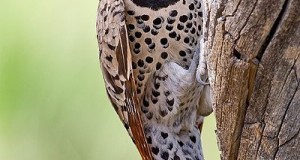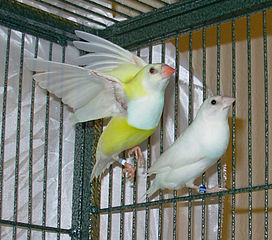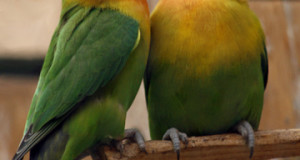 People have long pondered the role that “looks” and personality play in our personal relationships. Recent studies of the House Finch (Carpodacus mexicanus) suggest that similar considerations may arise when birds go courting as well.
People have long pondered the role that “looks” and personality play in our personal relationships. Recent studies of the House Finch (Carpodacus mexicanus) suggest that similar considerations may arise when birds go courting as well.
Drab Plumage…No Problem!
Working with wild House Finches in Arizona, ornithologists from Cornell University and the University of Arizona determined that females preferred brightly-colored (red) males to duller, orange/yellow individuals (American Naturalist, September, 2010). The somberly-colored males, however, were not so easily put off. It seems that, in order to compete with “handsome” males, they become more sociable – “friendlier”, if you will – and in that way attract the attention of the otherwise uninterested females.
In fact, dull-colored males were 4 times as likely to join up with and participate in multiple social groups, or flocks, than were the more brightly colored males (who, it seemed, merely had to sit about and wait for females to come to them!). By moving from flock to flock, the dull males placed themselves in situations that increased their chances of meeting a potential mate. By the end of the mating season, the dull males had achieved the same rate of breeding success as had the colorful males – they just had to work harder at it.
Whether or not the duller males’ “sociable personalities” helped sway the females’ decisions was not determined, but it is tempting to speculate…
Applying the Research
This study is not merely an amusing bit of information…I learned, from long experience with endangered birds in zoos, that mate selection is often a critical factor in a breeding program’s success. Especially we have only a few individuals to work with, knowing as much as possible concerning what constitutes an “ideal mate” is vital.
The House Finch is closely related to both commonly-kept pets and highly endangered species, and so much of what we learn about it may have wide applicability.
Male House Finch image referenced from wikipedia and originally posted by Kevin Cole
 That Bird Blog – Bird Care and History for Pet Birds
That Bird Blog – Bird Care and History for Pet Birds




Hello Frank, Can you send me something on White-Bellied Caique’s Thank you, Linda Austin
Hello Linda, Frank Indiviglio here.
Thanks for your interest in our blog. Please check out this 2 part article on Caique care and natural history (title should read “White-Breasted”).
Good luck, enjoy and please let me know if you need anything further.
Best regards, Frank Indiviglio.